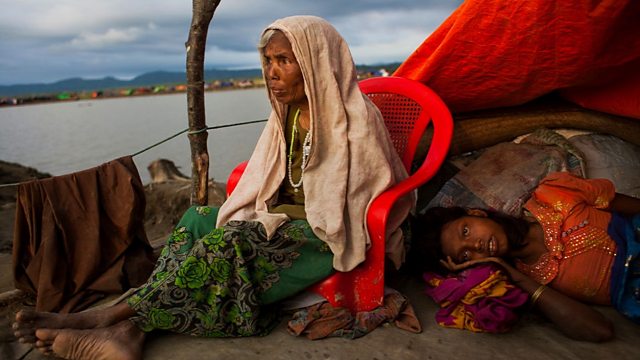Rewriting History
Denial in Myanmar over the plight of the Rohingya; India's open prisons; ancient rock art in Somaliland; a Jamaican village founded by escaped slaves and (nearly) free of crime
There's international outrage over the plight of the Rohingya - but at home in Myanmar there's almost no sympathy.
Pascale Harter presents this and other correspondents' stories from around the world.
Nick Beake has been based in Myanmar for some months now - and finds that there's one topic which can almost always bring a friendly conversation to a screeching halt: the Rohingya. Within Myanmar, this ethnic minority is widely despised - and in Yangon there's little concern among the public about the stories of the armed forces committing rape, arson and murder of Rohingya people in Rakhine state. There are now nearly three-quarters of a million Rohingya living just over the border in Bangladesh, after fleeing the military offensive; yet as Nick hears, for the Burmese man in the street, reports of all this are "fake news" about atrocities which "just never happened."
Masuma Ahuja gets a look at life not behind bars, but beyond bars - at an open prison in Jaipur, Rajasthan. While the Indian criminal justice system moves slowly, and there are many people held in jail for years before trial, the prison network works hard to rehabilitate inmates (even convicted murderers) and allows them a surprising amount of freedom to work, marry and leave the grounds ... as long as they're back in for roll call every evening.
Neil Trevithick describes the view from a cave full of prehistoric rock art in Somaliland. Five thousand years of human migration and effort are recorded there - and today it's watched over by nomadic camel herders with mobile phones.
And Lois Pryce is in Accompong, Jamaica - a settlement founded by slaves who escaped from British plantations, then fought for and won their freedom. It's a small, tightly-knit community, proud of its roots, but still welcoming to strangers. And it's also managed to buck the prevailing high rates of crime and violence in much of the rest of the island.
Photo: : Rohingya ethnic minority people fleeing to a temporary makeshift camp, and trying to settle temporarily there, after crossing over from Myanmar into the Bangladesh side of the border, September 14, 2017. (Photo by Ahmed Salahuddin/NurPhoto via Getty Images)
Last on
More episodes
Broadcasts
- Sat 2 Mar 2019 23:06GMTΒι¶ΉΤΌΕΔ World Service
- Sun 3 Mar 2019 04:06GMTΒι¶ΉΤΌΕΔ World Service
- Sun 3 Mar 2019 09:06GMTΒι¶ΉΤΌΕΔ World Service
- Sun 3 Mar 2019 17:06GMTΒι¶ΉΤΌΕΔ World Service News Internet

